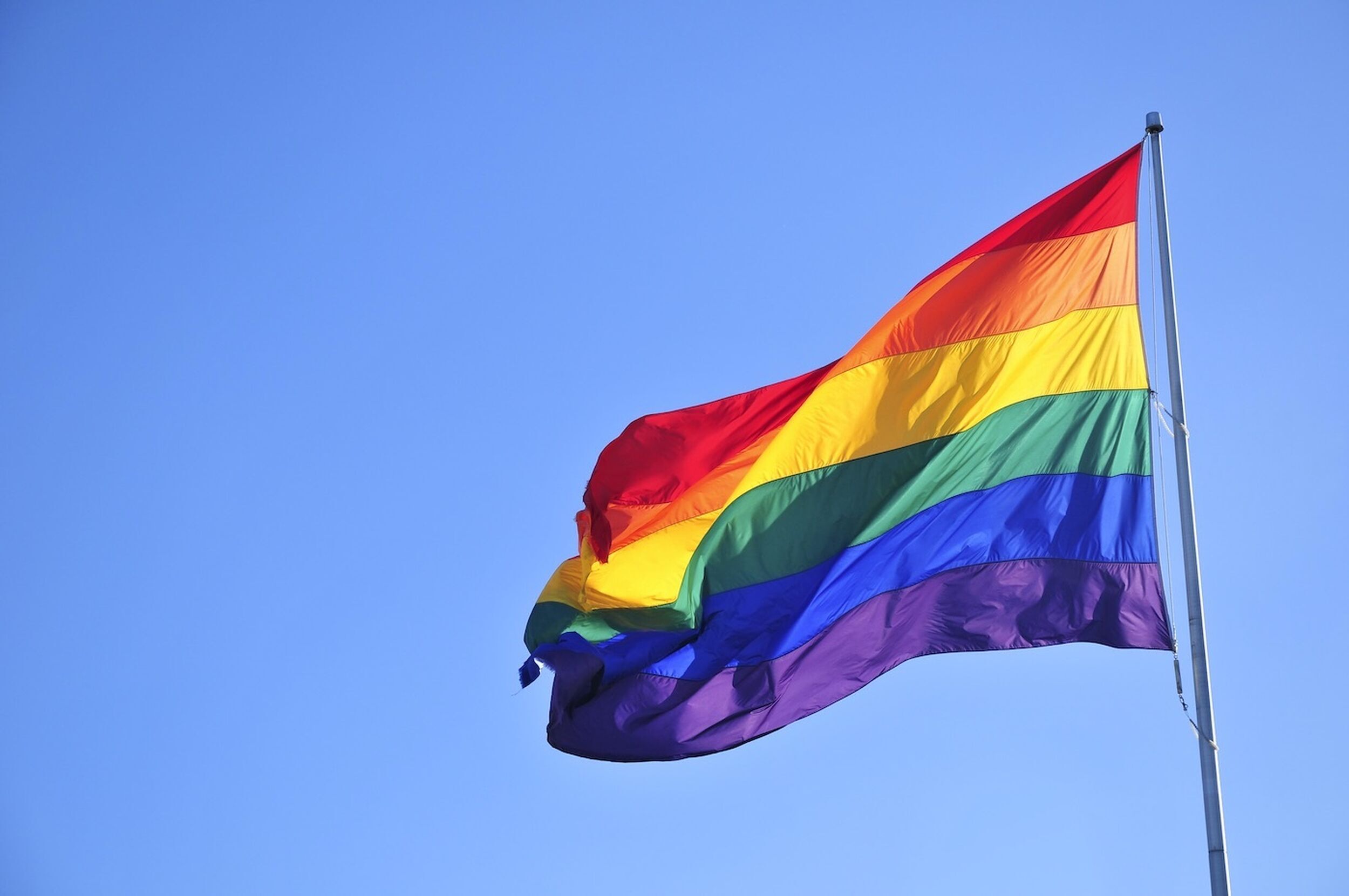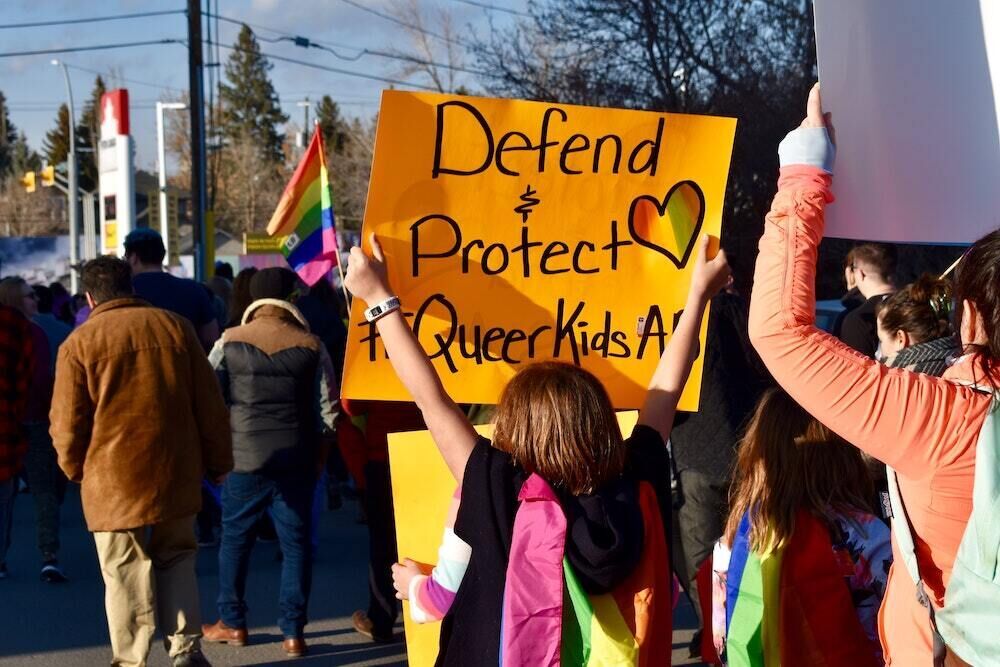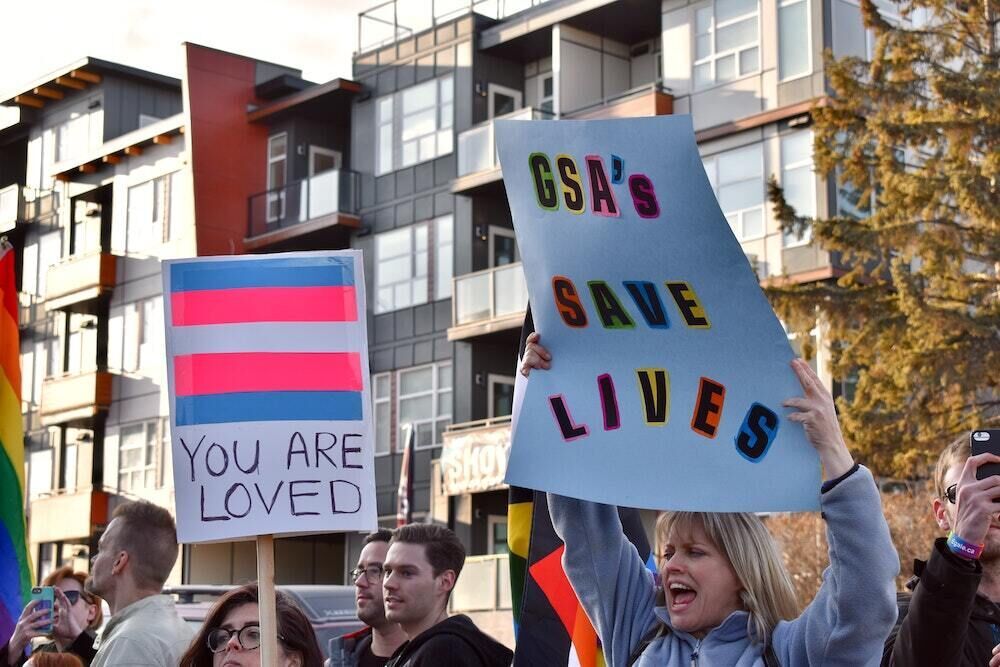
Photo: iStock.com/AK2
Are the queer kids alright in Kenney’s Alberta?
After Bill 8, protections are less certain.
Author’s note: Most of the people I spoke to for this story preferred to remain anonymous, given the subject matter; as such, The Sprawl has agreed to change some of the names in this piece.
Eleven-year old Kaden is bright, enthusiastic, and more articulate about Alberta politics than you’d expect a tween to be.
Drinking a hot chocolate at a trendy northwest coffee shop, Kaden—whose name has been changed—bragged about their rainbow lanyard and gushed about seeing The Louder We Get later in the day.
But the light faded from their eyes when they talked about the Calgary public elementary school they attended last year.
“It was really homophobic, and kids made lots of comments like ‘Oh, that’s so gay.’” When asked if the teachers took a stand against hurtful remarks, Kaden, who identifies as queer and uses they/them pronouns, shook their head. “They just mostly stood back.”
Kaden said it might have been different if their school had a Gay-Straight Alliance (GSA). Often called Queer-Straight Alliances or Gender and Sexuality Alliances, these staff-facilitated but student-led groups allow young people to explore issues related to gender identity and sexual orientation.
Research at the University of British Columbia shows that when schools have GSAs for at least three years, homophobic and transphobic discrimination, as well as suicide rates among students, are reduced by more than half.
And it’s not just LGBTQ2S+ kids who benefit from GSAs; heterosexual boys’ suicide risk is also halved.
What's changed under the UCP?
For the last two decades, GSAs have been cropping up in elementary, middle and high schools across the country. However, in Alberta’s conservative political climate, many worry that GSAs are not the safe haven for youth that they’re intended to be.
“It’s a very fearful time,” said Tonya Callaghan, associate professor at the University of Calgary’s Werklund School of Education. “That’s why you saw a lot of protests on the part of young people when the new government came into power. Young people saw the writing on the wall.”

Callaghan is one of many who are worried about LGBTQ2S+ kids in the wake of legislative changes made by the UCP. Chief among them is Bill 8, which amended Alberta’s Education Act and replaced what Callghan says was among Canada’s strongest pieces of provincial legislation protecting GSAs.
When Bill 8 was introduced in June 2019, three items stood out to LGBTQ2S+ advocates.
Firstly, the NDP’s Bill 24 required principals to “immediately” permit a GSA when a student requested one, but that word was removed.
Secondly, the old Education Act stated that schools could only tell parents if a GSA exists at the school, not who was in them. Today that information can be released if deemed necessary.
Lastly, the old act subjected schools to a penalty if they did not create and publicize anti-bullying policies with explicit protections for students from homophobia and transphobia.
After an excruciatingly long debate, Bill 8 passed third reading on July 3.
While the changes introduced by Bill 8 might seem small, they are anything but.
'Those are children’s rights as well'
On June 10, Justice Minister and Solicitor General Doug Schweitzer said in the legislature that the new legislation would still ensure GSAs have among the country’s strongest protections. NDP MLA Janis Irwin asked him directly what many Albertans were trying to figure out: Then why change the legislation at all?
Schweitzer dodged the question and chided Irwin for not celebrating the bill. “I already noted, we support making sure that we have the strongest protections for gay-straight alliances in all of Canada.”
As Bill 8 went through debate, the UCP emphasized the amendments would “modernize” and “strengthen” Alberta’s education system; but what they talked about less is that the bill would also strike a balance between “protecting children and their privacy with the rights of parents."
We support making sure that we have the strongest protections for gay-straight alliances in all of Canada.
While the changes introduced by Bill 8 might seem small, they are anything but—and students, teachers, and parents are feeling the consequences.
Removing the immediacy provision, Callaghan says, is particularly worrying for students in the Catholic system, where leadership is more likely to treat being a sexual or gender minority as an “immoral lifestyle ‘choice.’”
Callaghan recalled that when she was a teacher in the Calgary Catholic school system in the early 2000s, staff would receive edited versions of the teachers' convention schedule, with any session pertaining to LGBTQ2S+ issues removed. While that doesn't happen anymore, some Catholic teachers have faced obstacles in recent years while trying to set up GSAs.
Callaghan comes back to the Charter of Rights and Freedoms, and its assurance that Canadians should have freedom of expression, conscience and association. “And those are children’s rights as well,” she said.
While most staff will use good judgment and protect student confidentiality, Hilary Mutch, the LGBTQ2S+ engagement coordinator for Calgary’s Centre for Sexuality, worries about “the perception that schools might not have the same level of safety as before for some of the most vulnerable youth in Alberta.”

Humanities teacher Audrey Greer (not her real name) has facilitated the GSA at a large, Calgary-area public high school for the last four years. In response to student fears about being outed, Williams and the GSA’s other facilitators have maintained that they will protect student anonymity at all costs—even if it means losing their jobs.
“A lot of our kids aren’t out. And a lot of them are, but there is still fear for everybody else,” Greer said.
Around the time of the election, Greer said students worried what a UCP win might mean. “What we’ve seen since then has really been following through on the promises of what was terrifying for our kids. And luckily they’re safe—but a lot of kids aren’t.”
A chill in the atmosphere
It’s not just students who feel a chill in the political atmosphere.
Teacher Katrina Williams, whose name has been changed, facilitates the GSA at a junior/senior high school in a small town outside Edmonton. Many of Williams’s friends, colleagues, and students know she’s gay, but she’s afraid to be fully out at school.
She says the provincial election highlighted the town’s homophobia, and worries how parents would react to her sexual orientation.
“I do not want parents to think that because I’m gay, I’m trying to recruit their children or convert them or mislead them in some way,” she said. “Because I think that is the impression that a lot of people would get.”
Williams’s GSA, which is well-supported by administration, doesn’t announce meeting times and congregates behind closed doors for the students’ safety and privacy; there will be no yearbook picture of the five or so students who regularly attend. Williams says there are many more who would benefit, “but there’s too much fear” of being outed or bullied for even being part of it.
The GSA was initially requested last year by a student who identifies as bisexual and wanted to make her school safer. However, her parents found out and forbade her from participating in the very group she created.
I would never want any kids to go through what I went through.
But youth are not passively riding out political undercurrents.
Audrey Greer says the students in her GSA are becoming increasingly aware of politics and informing themselves. “You get the sense that they’re starting to understand their parents’ political beliefs, and I haven’t seen that before,” she said. “There's this sort of association that, ‘my parents voted conservative and I know what the UCP believes about people like me.’”
'Kids in this province need more support'
Brandon Beavan is the co-chair for the NDP’s gender and sexual diversity caucus, and knows the need for safe spaces better than most 25-year olds.
“I was bullied relentlessly in the hallways, I was called faggot,” he said of his high school experience. Having a GSA, he said, “would have saved a lot of pain down the road [and] would have changed a lot of my self-worth… I think a lot of kids feel alone and scared.”
At 13, Beavan was subjected to conversion therapy by a registered psychologist who tried to convince him that being gay was a deficit to be fixed.
“I was told for a year that I was going to die before I was 30, that I was going to get addicted to drugs, that I was never going to know what love is.” That therapist is still in practice, and Beavan knows conversion therapy is ongoing throughout Alberta, and youth are particularly vulnerable.
“Kids in this province need more support, especially LGBTQ2S+ students,” Beavan said. “I would never want any kids to go through what I went through. That’s why we care so much. It’s not something we’re going to let up on.”
Mutch has put together a list on Instagram for ways GSAs can stay active — while protecting students’ safely — through this time.
Hilary Mutch emphasized that LGBTQ2S+ communities “are incredibly resilient... there are still very strong groups and students that, in spite of the shifts in dialogue and policy, have been able to thrive in starting and sustaining their GSAs.”
Indeed, as the COVID-19 pandemic has progressed, many GSAs are reorganizing themselves for a time of even greater need and fewer face-to-face resources.
Xtra reported recently that some of Alberta’s schools, such as Strathcona-Tweedsmuir School in Okotoks, are finding ways to connect their GSA students remotely. Hilary Mutch has put together a list on Instagram for ways GSAs can stay active—while protecting students’ safely— through this time.
Mutch works closely with youth across Calgary and said that no matter where the political climate in Alberta goes, “youth connecting and knowing themselves and being able to advocate for themselves is very powerful.”
Kaden started at a new Calgary public school last September, where staff and students are “supportive and really nice,” and proudly talked about watching a friend effectively stand up to a homophobic comment in the hallways.
Their new school has a GSA, and in looking at middle schools for next year, Kaden and their family won’t even consider schools without one, because “that’s a super-important part to me.”
Brianna Sharpe is a freelance journalist covering LGBTQ2S+ issues, politics, climate, and more. She lives on a mini-acreage in the Alberta foothills with her family.
Now more than ever, we need strong independent journalism in Alberta. That's what The Sprawl is here for. When you become a Sprawl member, it means our writers, cartoonists and photographers can do more of the journalism we need right now. Become a Sprawl member today!
Support in-depth Calgary journalism.
Sign Me Up!We connect Calgarians with their city through in-depth, curiosity-driven journalism—but can't do this alone! We rely on our readers and listeners to fund our work. Join us by becoming a Sprawl member today!
